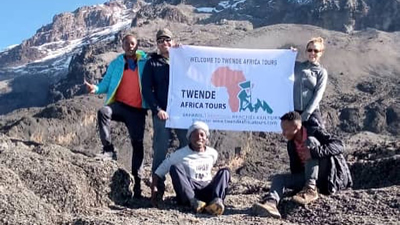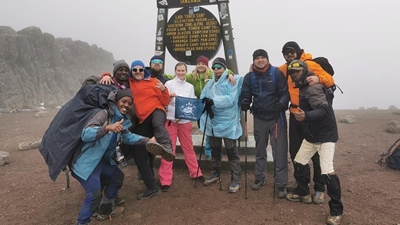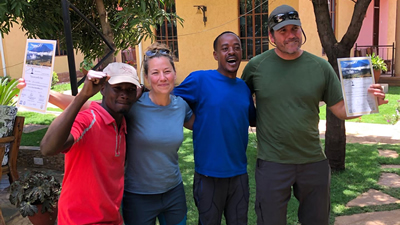Got questions about climbing Kilimanjaro? We are here to help.
We receive questions about climbing Kilimanjaro all the time. We have compiled a list of the most frequently asked questions about climbing Mt Kilimanjaro in general, and about climbing Kili with Twende Africa Tours specifically.
You've got questions? We've got answers.
Mount Kilimanjaro can be climbed anytime throughout the year. Most travelers prefer climbing during the dry seasons: December to March, June to October. Many consider the best months to climb Kilimanjaro to be January, February and September. More information visit VIEW BEST TIME TO CLIMB MT.KILIMANJARO
The trek up Kilimanjaro is not a technical climb. You do not require any mountaineering equipment to reach the summit. In fact, anyone in good physical condition can reach the top of Mount Kilimanjaro. You should be able to run for at least half an hour without feeling shortness of breath. You should also be able to walk for at least 2 hours in hilly terrains without feeling overly exhausted. No one with a sore throat, cold of breathing problems should go beyond 3000m. Anyone with heart or lung problems should consult his/her physician before attempting to climb Mt Kilimanjaro.
Yes, all Tanzania National Park (TANAPA) fees are included in our Kilimanjaro price. Currently,fees at Kilimanjaro National Park include day,night,rescue and camping or hut fees. Crew entry fees and Tanzanian Forest Services Agency (TFS) fees (applicable for Rongai, Shira and Lemosho routes) are also included in our Kilimanjaro price.
The minimum age limit set by Kilimanjaro National Park for children trekking to Uhuru Peak on Mount Kilimanjaro is 10 years old.
You can expect equatorial to arctic conditions on Mt Kilimanjaro. Depending on the route chosen, you will begin your trek in dry plains or tropical forests with average temperatures between 25oC and 30oC. You will then ascend through various terrains and weather zones to 67 arrive at the permanently snow-capped summit. Expect rainfalls and sub-zero temperatures on your trek.
Depending on the route chosen, most trekkers take 4-6 days to reach the summit. The longer you spend on the mountain, the more time your body gets to acclimatize, the higher the chance you will succeed in reaching the summit of Kilimanjaro.
Soft kit bag or rack sack (for porters to carry), small daypack (for you to carry), rain cover for backpack/bags, dry sacs for packing inside, sun hat/cap, woolly hat/toque, scarf, balaclava, sunglasses, waterproof jacket and trousers, four-season duvet jacket, warm upper body layers, thermal under layers, trekking trousers, shorts (optional), underwear/sports bra, waterproof gloves, thin gloves, gaiters, thick socks, thin socks, waterproof hiking boots, spare laces, jogging shoes or flip flops for around camp, walking poles, sleeping bag, water bottles or hydration bladder, water purification tablets (optional), water flavoring or rehydration salts, favorite snacks, knee support (optional), eye protection goggles (for wind/dust/glare on summit), head torch, spare bulb, camera, memory cards, spare batteries, towel, toiletries, lip balm, sunscreen, toilet paper, hand sanitizer, wet wipes, personal first aid kit, medication (Diamox optional), insect repellent, pen/paper/playing cards
Yes, any excess luggage you do not need to carry with you on Mount Kilimanjaro can be left at our office or at the hotel. You should keep valuable items with you at all times.
Each porter can carry up to 20kg of luggage, As regulated by Kilimanjaro national park, porters can no more 25kg of total weight including their own personal gears.
Our typical food on the mountain includes:
Breakfast:
Lunch
Lunch
If you have any suggestions about meals, please do not hesitate to advise and we will work on it as you prefer.
Most certainly! We can cater for vegetarian, gluten-free, or any other special diets. Kindly advise at the time of booking.
Is an option to join a group of 1-8 travelers if you wish, we operate private guided climbs as well.
Yes, absolutely! Because we do not join groups together, you can choose to start your climb on any day you choose.
Before obtaining their license, all guides need to attend training provided by Kilimanjaro National Park - on theory and practical components as well as First Aid. They will need to pass an exam before they can get their license. We would never consider anyone who is not certified. We always interview potential candidates before we would hire them. We would only use someone who is knowledgeable, has good attitude and good English as assistant guide. We reject a lot of candidates asking for job because they do not meet our standards. Before we would promote someone as chief guide, he would need to have a lot of experience on the mountain and has many good feedbacks from clients. Still we would retrain lead guides and let them know of clients' feedback so they can keep improving.
We always boil and filter drinking water for our clients. Cooks always make sure the food is well cooked and utensils are sterilized with clean hot water before they are used. The mess tent is cleaned on a daily basis. Mess tents are solely reserved for clients' use and we do not allow porters to sleep in them.
Yes. The price also includes the salary of a porter to carry the oxygen tanks during your summit attempt.
Yes, portable toilet is available for rental at US$200/group (up to 4 climbers).
You will have 4-6 porters per person for your group. This depends on your group size and the weight of your luggage.
The porters will carry all the tents, food, and the luggage that you do not require while hiking so you will only need to carry a day pack during the day.
We use high quality of waterproof tents imported from the USA, Canada and Australia. We also provide foam mattresses designed for mountain excursions (not the thin yoga mat type).
All of our lead guides are trained and certified in the following areas: altitude sickness and recognizing symptoms in the early stages, emergency use of oxygen, wilderness first responder and performing CPR. Each guide carries a first aid kit which includes: paracetamol, Imodium, ibuprofen, rehydration salts, paraffin gauze, sterile swabs, bandages, plasters, cotton wools, latex gloves & tongs, antiseptic disinfectant, antimicrobial cream, antihistamine, Diamox, etc.
We check in with the clients and crew daily at camp as they are equipped with mobile phones. Each ranger post also has radio communication.
Because you will have many guides and assistant guides, an assistant will take the ill person down while the rest of the group goes on. If the person is extremely sick then we call for a dispatch for stretcher - the rescue fee is included in your quote. But before reaching that point, our guides are very careful and they will monitor the health of everyone everyday on the mountain to make sure that the sickness does not get to that point.
We would recommend that you carry no more than 10kg. The average is 7kg. You only need to carry the essentials (3 L drinking water, valuables, camera, lunch/snacks, rain layer). The rest of the items you can leave with porters to carry.
Yes. In addition to paying a proper wage above minimum rate and supplying proper food and tents on the mountain, we also cover for any medical expenses in case of injury or illness arising from work.
Most certainly! Please ask, we are here for you.
Many different factors affect the climbing prices. Kilimanjaro climb can cost from $1,400 (standard) to over $7,000 (luxury package) and above. Blend this knowledge with the fact that there are 250 licensed and hundreds of unlicensed operators in the region and making the right choice becomes a major task. In fact, to understand how the climbing Mt. Kilimanjaro cost is formed many different factors should be taken into consideration. Kilimanjaro Climb Price Components like Kilimanjaro National Park Fees, Climbing Crew Wages, Supplies and Logistics, Amortization Costs, Indirect Taxes, Price of Hiking Comfortably, Price of Hiking Safely, Price of Accommodation Before and After Climb, Operator’s Commission

Can I climb Kilimanjaro during the coronavirus pandemic?
There are no bans or restrictions in place for travel into Tanzania.

How Long Does it Take to Climb Kilimanjaro?
Hey you, the one who daydreams of climbing Mount Kilimanjaro’s summit at sunrise.

How to avoid altitude sickness On Mount Kilimanjaro?
Altitude sickness, also called Acute Mountain Sickness (AMS), hypobaropathy and soroche, is an illness caused by exposure to the low air pressure;

What does a Kilimanjaro Climb Cost?
The cost to climb Kilimanjaro with Twende Africa Tours is between $1,560–$3,250 per climber